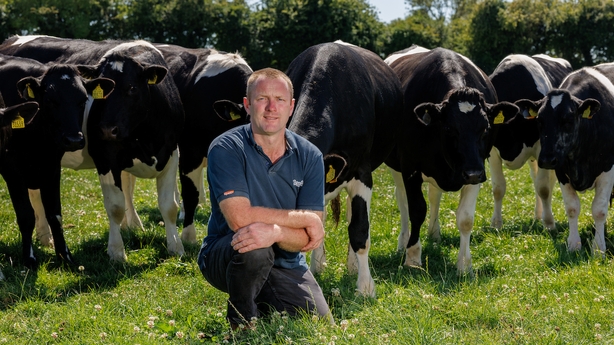The President of the Irish Creamery Milk Suppliers Association has said dairy farmers had been "led up the garden path" over the Government's plan to introduce a scheme to compensate them to cull cows from their herds.
Denis Drennan said: "The Minister's own officials proposed this scheme in February 2022, they put figures on it and the Minister stated publicly what the 'base year’ would be.
"This created an expectation, and farmers began making preparations on the basis that the scheme was on the way. Today, after waiting for two years, they realise that they have been led up the garden path," Mr Drennan said said.
He added that Department officials met with the ICMSA several weeks ago and indicated the scheme was still under active consideration.
Now, Mr Drennan claimed Minister for Agriculture Charlie McConalogue is "going to regulate them out of existence with no exit package".

He added: "It is unbelievably cynical and gives a glimpse of what the Irish Government really thinks of its dairy and livestock farmers and the sectors that they built."
Other 'options' before any dairy reduction scheme - Government
It follows Mr McConalogue saying that he believes there are "options on the table" to be pursued before introducing any scheme to compensate dairy farmers.
An exit and reduction strategy has been recommended by the Food Vision dairy group to compensate farmers.
Speaking on RTÉ's Morning Ireland, Mr McConalogue said the Government is committed to continuing its nitrates derogation scheme and is taking steps to ensure water quality is maintained.
"It's about how we manage nutrients and making sure we do that effectively. I put together about 18 months ago now a stakeholder group of farmers and co-ops all within the sector to make sure that we're taking the steps which will see water quality improve and to make sure that we're maintaining that derogation."
The nitrates derogation allows farmers to farm at higher stocking rates when they take extra steps to protect the environment.
In effect, a farmer must not exceed two dairy cows per hectare without a derogation but can farm at almost three cows per hectare if approved.
Asked how the dairy herd could be reduced by 65,000 a year for the next three years without an exit scheme Minister McConologue said: "There is real significant change ongoing at farm level at the moment.
We need your consent to load this rte-player contentWe use rte-player to manage extra content that can set cookies on your device and collect data about your activity. Please review their details and accept them to load the content.Manage Preferences
"Over the last two years, we've seen a 30% reduction in just two years in relation to the amount of fertilizer that is sown over those two years across farms across Ireland.
"Alongside the reduction of 30% we're seeing in fertilizer use in just the last two years alone, we're seeing farmers rapidly adopt multispecies sward which is equally productive in relation to grass production, but is much better from a water quality point of view and a sustainability point of view.
"We're also seeing farmers adopt new technology in relation to the low emission slurry spreading machines and I'm providing 60% grant aid for that.
"There's very significant work on the way in our beef sector through the beef data genomics programme in relation to improving the genetics of our herd, which can see emissions reduced as well."
Asked again about how the national herd could be reduced without an exit scheme, Mr McConologue said that he hopes to see further growth in the tillage sector.
"It's obviously under pressure at the moment, particularly given that the late growing season.
"If we produce more tillage in the country that's something that will look will reduce our emissions overall."
An Taisce said that farmers and the environment will lose out from the absence of an exit scheme to encourage farmers to leave dairying.
Spokesperson Elaine McGoff said: "Instead of leadership, like we see in Denmark, we get ... a commitment to the derogation while putting ineffective measures in place for nitrates and scrapping a potential retirement scheme for dairy farmers.
"Farmers and the environment are being failed here," she added.
Decision on voluntary exit scheme is 'Charlie's call' - Ryan
Minister for Climate, Communications and Transport Eamon Ryan has said the decision on whether there is a voluntary exit scheme for dairy farmers is "Charlie's [McConalogue] call".
Speaking at the launch of a new transport hub for Bray, Mr Ryan said he was not surprised by comments made by Minister McConalogue "that there wouldn't be a scheme".
Mr Ryan said "the proposal for that came from the agriculture sector actually, came from farmers and that is Charlie's call".
Asked if he thought it would be necessary to reduce the dairy herd in order to meet climate and water quality targets Eamon Ryan said: "I think what will come is the numbers of cattle will depend on a number of factors.
"And as we diversify to other sources of income, that may reduce the herd, the overall herd, but it increases the income, that's what we need to focus and fixate on, rather than having a preset, self-determined 'this is the size of the herd’.
"You introduce the alternative incomes, that's what will have an effect in reducing animal numbers in some cases," Mr Ryan said.
Additional reporting: Colman O'Sullivan







